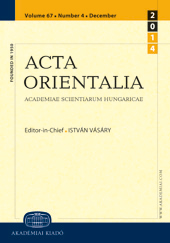What makes a good poet according to Someśvaradeva? Poetic merit, demerit and the ethics of poetry in the Surathotsava and the Kīrtikaumudī
What makes a good poet according to Someśvaradeva? Poetic merit, demerit and the ethics of poetry in the Surathotsava and the Kīrtikaumudī
Author(s): Bihani SarkarSubject(s): Cultural history, Ethics / Practical Philosophy, Other Language Literature, 13th to 14th Centuries, Theory of Literature
Published by: Akadémiai Kiadó
Keywords: Sanskrit poetry; ethics of mediaeval Sanskrit poetry; Surathotsava; Kīrtikaumudī; Someśvaradeva; satire;
Summary/Abstract: In 13th-century Gujarat, the court of the Caulukya emperors in Aṇahilavāḍa-Pāṭan offered patronage and employment to a highly learned group of individuals. These men also wrote poetry and drama in their spare time – for their amusement, as a mark of culture and to comment upon the events of their times. Within this group, Someśvaradeva, royal chaplain to the Caulukya monarch Bhīma II and his Vāghela successors Lavaṇaprasāda and Vīradhavala, was renowned for having written a composition in only one and a half hours. He offers us in his writings a wealth of historical information on his political circumstances, along with subtle reflections on the ethics of poetry. Who is a good poet? Who is a bad poet? Is a good poet a virtuous individual (sajjana)? Is a bad poet a rogue (durjana)? Who are the models of poetic propriety? Such are some of Someśvaradeva’s concerns. These frequently satirical commentaries on standards of poetry and the ideal poetic disposition appear in the preambles to his two epic poems, the Surathotsava 1.30–64 and the Kīrtikaumudī 1.7–46. Despite their sophistication, they have hardly interested most scholars working on these texts. The article analyses these passages in detail for the first time, and examines the ethics that Someśvaradeva, and the poets of his company, felt underlay the art of poetry.
Journal: Acta Orientalia Academiae Scientiarum Hungaricae
- Issue Year: 66/2013
- Issue No: 1
- Page Range: 25-45
- Page Count: 21
- Language: English
- Content File-PDF

